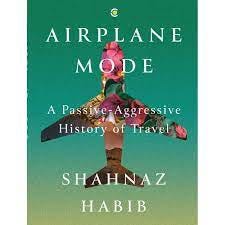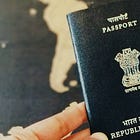Dear Global Jigsaw,
Thank you so much for reading this newsletter. Please do support it by becoming a paid subscriber by clicking below. For those who cannot afford to, these posts remain free to read. But do keep in mind the labour they take to create :-)
There is a certain type of person, and I count myself among this demographic, who equates travel with virtue. We proselytize crossing borders as a way of breaking free of narrow domestic walls. We advise moving outside of our comfort zones in order to feed curiosity and develop empathy.
But amidst this conception of travel as self-improvement, the question of who gets to travel, and under what circumstances, is easily ignored. A young German male backpacker and an older, head-scarved, Iranian woman may travel in the same planet, but these might as well be different planets.
Race, religion, gender, class, and above all, nationality determines the caste system of global travelers, wherein first world-passport holders are the hereditary brahmins, with the rest of the globe fitting into differing levels of hierarchy. Like caste, travel is about birth rather than choice.
In her (brilliant) book, Airplane Mode, writer Shahnaz Habib recalls attending a travel documentary-related job talk whilst in graduate school in the United States. The power point presentation began with a discussion of the vacation-related habits of peoples from different parts of the world. “Europeans travel in August,” “cruises are for retired Americans,” etc. The final, punchline slide read: “People from the Third World do not travel, they immigrate.”
Those who identify as sensitive travelers, are often flashy virtue signalers. They volubly abhor racism, sexism, homophobia et al. Their cosmopolitan values are in opposition to these blinkered world views. But the most basic enabler of travel for global brahmins, the passport, is also the greatest impediment to free movement for the world’s backward castes. And yet passportism, or discrimination against third world passports, somehow hides in plain view, as a perfectly valid form of bias, free of the moral repugnance that casteism and its ilk provoke.
Most passport brahmins remain blissfully unaware of the humiliations inflicted on passport dalits, in the manner in which white people often declare there to be no racism because they have never experienced it. But unlike other forms of bigotry, passportism has an objective ranking. According to the Global Passport Index a French passport allows one to travel to 135 countries without a visa. For an Afghan national that number is 7.
(Here is a link to a piece I wrote a while ago about my ordeal getting a British visa:
)
*****
Given how today, a French passport is the equivalent of a key to the world, it is ironic that the document has its roots in locking down undesirable movement. In France, as in many other parts of Europe, including Britain and Russia, passports were originally intended to limit the movement of peasants from the countryside to the cities. Saddling peasants with the necessity of travel permits protected city dwellers from overcrowding and resource scarcity, allowing them their pleasant, rabble-free, gentility. In contemporary times, there is an equivalent in the Chinese hukou- an internal passport that polices the access of people from rural areas to urban spaces in China.
Despite its metaphorical association with access – think of phrases like “a passport to a better life”- a passport is almost always as much about restriction - a hydraheadedness that remains embedded in contemporary passportism.
Another kind of travel document, one granting safe passage to the bearer in foreign lands, issued in the name of a royal or religious eminence has an even longer history. The earliest mention of one appears in the Old Testament of the Bible, wherein the prophet, Nehemiah is granted letters from the ancient Persian king Artaxerxe, requesting the governors of the lands beyond the Euphrates to grant him safe passage to Judah (modern day Israel/Palestine).
In Britain, the first reference to a “safe conduct” document dates to a 1414 Act of Parliament, during the reign of Henry V. Almost 200 years later in 1599, Shakespeare made a lyrical reference to this early passport in his play about the same monarch. On St Crispin’s Day, on the eve of the Battle of Agincourt, the bard has Henry V urge his men to fight against the larger French forces.
“That he which hath no stomach to this fight, Let him depart; his passport shall be made,” said the fictional Henry V.
If visas had existed then, caveats would have been needed. “Let him depart; his passport shall be made, although that gent shall needeth to waiteth f'r a visa appointment and yond might seeth that gent well into fusty age. Bett'r to just square the French.”
Henry himself, like all successive monarchs was not subject to the need for a passport in order to travel, the argument being that passports are issued to British nationals in the name of the ruler. Even today, King Charles remains sans-passport, the ultimate by-birth Brahmin.
In fact, for much of the 19th century, birth Brahmins - high-born men from whiyte nations - could swan about the world without passports and with servants, if their bearing was sufficiently haughty to ensure that no questions were asked. If you looked like you were born to mobility, you could usually enjoy it.
Passports, as we recognize them today, made an appearance only about a century ago, rising from the ashes of World War -1. The Great War accentuated the nation-ness of nations. Questions of who properly belonged inside what boundaries became exigent, ostensibly on grounds of national security.
In 1920, the League of Nations suggested a worldwide passport standard. Four years later, the United States passed the Immigration Act of 1924 to limit the influx of immigrants to the right kind. And how did one determine who was right and who wrong? By identifying their country of origin via their passports.
There are multiple ways to discriminate based on colour: skin yes, but also travel documents.
The cleverness of the passport as a standard for sorting humans, lies in its purported objectivity. Imagine someone who is a staunch believer in Enlightenment values and, as a corollary, is appalled by the caste system. It would be rather awkward for this someone to justify the restriction of the mobility of another, purely based on the colour of their skin. The passport, however, is the hypocrite’s ally.
****
Have comments? Please do share them, and this post as well. Eternal thanks - especially if you are a paid subscriber :-)
Until next week,
Un abrazo,
Pallavi





Awesome treatise on this issue which vexes those of us who dare think we are global “citizens”
I love this! I’ve taught a class about borders but didn’t get into passports which is so interesting and important. I do teach an abbreviated version within other course so I might just add this to the reading list ❤️